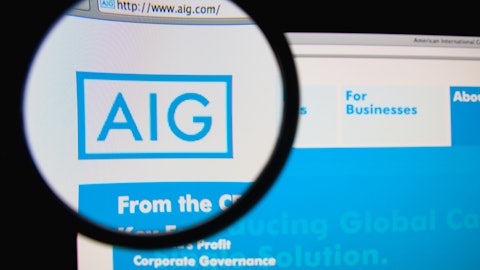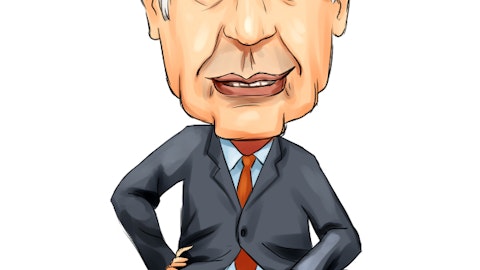Looking for high-potential stocks in the seemingly overvalued equity markets? Follow activist investors’ targets and campaigns! A recent study has concluded that companies targeted by activist investors tend to outperform the broader market benchmarks, but also tend to perform significantly stronger as a business. However, this investment strategy does not instantly generate the desirable results and profits, so it is rather suitable for long-term oriented investors. The 13D Activist Fund, a mutual fund that tracks the moves of activist investors founded by its Chief Investment Strategist Ken Squire, has outperformed the broader market each year since 2012. That being said, the following article will analyze and discuss three 13D filings submitted by several well-known and successful activist hedge funds tracked by Insider Monkey.
Following activist funds is important because it is a very specific and focused strategy in which the investor doesn’t have to wait for catalysts to realize gains in the holding. An activist fund can simply create its own catalysts by pushing for them through negotiations with the company’s management and directors. In recent years, the average returns of activists’ hedge funds has been much higher than the returns of an average hedge fund. Furthermore, we believe do-it-yourself investors have an advantage over activist hedge fund investors because they don’t have to pay 2% of their assets and 20% of their gains every year to compensate hedge fund managers. We have found through extensive research that the top small-cap picks of hedge funds are also capable of generating high returns and built a system around this premise. In the 37 months since our small-cap strategy was launched it has returned 102% and beaten the S&P 500 ETF (SPY) by more than 53 percentage points (read more details).
Follow Paul Singer's Elliott Management
According to a Schedule 13D filed with the SEC, Paul Singer’s Elliott Management and its affiliates collectively own 67.06 million shares of Alcoa Inc. (NYSE:AA), which account for 5.1% of the company’s outstanding common stock. The freshly-disclosed stake includes 19.65 million shares of common stock underlying exercisable options and 36.65 million shares underlying physically settled swaps. Elliott Management has additional economic exposure comparable to roughly 1.3% of the company’s shares. The activist hedge fund firm owned call options underlying a mere 2.0 million shares on September 30. The aforementioned public filing also outlined Elliott Management’s belief that the shares of the aluminum producer “are dramatically undervalued by the public market”, but also applauded the company’s spin-off transaction. On September 28, Alcoa Inc. (NYSE:AA) announced its intentions to separate into two independent, publicly-traded companies: one company will focus on upstream aluminum production and midstream production, while the other one will focus on “value-added” operations. Meanwhile, shares of Alcoa gained 4.37% on Monday and have advanced by an additional 0.44% in today’s pre-market trading session.
The hedge fund sentiment towards Alcoa’s stock did not change significantly during the third quarter, as the number of hedge funds invested in the aluminum producer increased to 46 from 45 quarter-over-quarter. These hedge fund investors had accumulated 12.60% of the company’s shares as of September 30, while the value of their investments climbed to $1.59 billion from $1.12 billion during the three-month period. Seth Klarman’s Baupost Group added a 52.27 million-share position in Alcoa Inc. (NYSE:AA) to its portfolio during the September quarter.
Follow Howmet Aerospace Inc. (NYSE:HWM)
Follow Howmet Aerospace Inc. (NYSE:HWM)
Receive real-time insider trading and news alerts
Let’s head to the next page, where we discuss two other activist targets, including Icahn’s latest statement on AIG.
On Monday, reputable activist investor Carl Icahn of Icahn Capital LP released a statement regarding American International Group Inc. (NYSE:AIG), expressing his discontent with the unwillingness of the company’s CEO to take the steps the activist investor recently proposed. Let us remind you that the feared activist recently wrote a public letter to CEO Peter Hancock, “suggesting that the company should accelerate cost cutting and separate into three public companies to shrink below the threshold for systematically important financial institutions” (read more details). Icahn Capital and its affiliates own 42.24 million shares of AIG, representing 3.42% of the company’s outstanding shares. Icahn outlined in the recently-released statement that he will accept the CEO’s offer to discuss the aforementioned proposed steps, but he does not reckon that the CEO “will ever sincerely consider what we, and so many others, have proposed”. Thus, the activist investor intends to commence a consent solicitation that will allow AIG’s shareholders to “express their views directly to the board, which may include a proposal to add a new director who would agree in advance to success Mr. Hancock as CEO if asked by the board to do so”. A few hours after the release of Icahn’s statement, the insurer announced its intentions to “take additional actions to further accelerate its previously announced strategy”, which will be communicated in the near future.
Follow Carl C. Icahn's Icahn Capital LP
In the meantime, American International Group Inc. (NYSE:AIG)’s shares have advanced by 12% since the beginning of the year and are trading at an attractive trailing price-to-earnings ratio of 18.46, below the average of 23.12 for the S&P 500 benchmark. The insurer lost some of its charm among the hedge funds monitored by Insider Monkey during the third quarter however, as the number of top money managers invested in the company declined to 94 from 99 quarter-over-quarter. Similarly, the value of the money poured into the stock dropped to $8.43 billion from $11.40 billion during the quarter. John Paulson of Paulson & Co., another advocator of the aforementioned separation, owns 14.60 million shares of American International Group Inc. (NYSE:AIG) as of September 30.
Follow American International Group Inc. (NYSE:AIG)
Follow American International Group Inc. (NYSE:AIG)
Receive real-time insider trading and news alerts
As stated in a separate 13D filing, Kelly Cardwell’s Central Square Management owns 1.35 million shares of PICO Holdings Inc. (NASDAQ:PICO), which account for 5.9% of its common stock. This compares with the 1.32 million-share position revealed through the fund’s latest 13D filing on the company, disclosed in mid-October. Most importantly, Central Square sent a letter to PICO’s Chairman, Kristina Leslie, and its Board on Monday, expressing its dissatisfaction with “the Board’s laissez-faire attitude toward the need for change”. The investment firm calls on PICO’s Board to seat three proposed individuals, including Anthony Bergamo, James Henderson and Daniel Silvers. Central Square also asks the Board to hold PICO’s 2016 annual meeting of shareholders no later than April 15, 2016. In mid-October, the activist investment firm laid out a set of suggestions that it believes would unlock shareholder value at the company, which included: a formal sale process for subsidiary UCP, monetization of a portion of its water portfolio, and the overhaul of its compensation practices. Meanwhile, the shares of the holding company are down by 42% for the year and are trading at a discount to their book value. Thus, it remains to be seen whether Central Square’s recommendations and suggestions will help PICO in addressing its “prolonged underperformance and poor governance”.
The number of smart money investors with positions in PICO Holdings Inc. (NASDAQ:PICO) climbed to 11 from ten during the third quarter, while the value of these positions shrank to $34.94 million from $54.59 million quarter-over-quarter, largely due to the decline in the stock price during that time. These investors had stockpiled 15.70% of the company’s outstanding common stock as of September 30. Royce & Associates, founded by Chuck Royce, holds a 1.55 million-share position in PICO Holdings Inc. (NASDAQ:PICO) as of the end of September.
Follow Vidler Water Resources Inc. (NASDAQ:VWTR)
Follow Vidler Water Resources Inc. (NASDAQ:VWTR)
Receive real-time insider trading and news alerts
Disclosure: None



